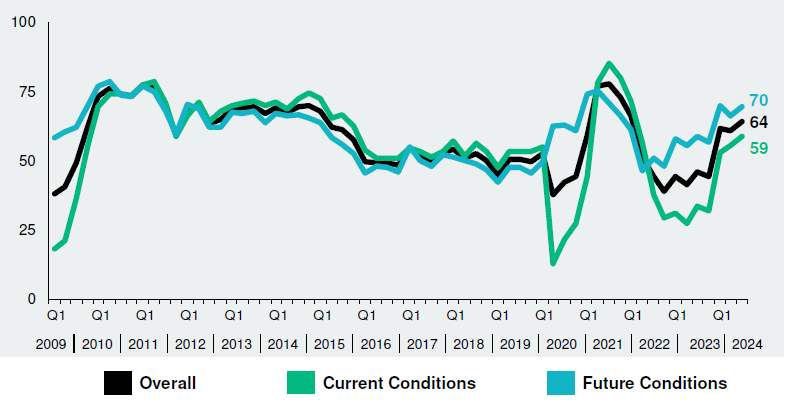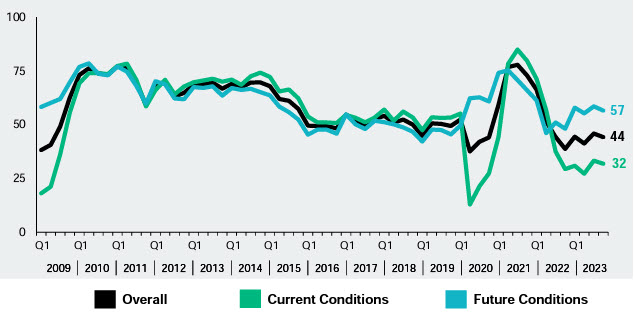Kathleen McCarthy Takes Over As New Chair Of The Roundtable’s Board Of Directors; John Fish Commended For Three Years As Roundtable Chair
(WASHINGTON, D.C.) — The Real Estate Roundtable announced its FY2025 leadership today, with Kathleen McCarthy (Global Co-Head of Blackstone Real Estate) beginning a three-year term as Roundtable Chair on July 1, 2024. Ms. McCarthy succeeds John Fish (Chairman & Chief Executive Officer, Suffolk) who has served as Roundtable Chair since 2021. The Roundtable’s membership also approved a 26-member Board of Directors.
Kathleen McCarthy, Chair of the Real Estate Roundtable, said, “I am incredibly honored to step into the role of Chair of the Real Estate Roundtable. The real estate industry touches every aspect of our economy—from affordable housing and shopping centers to warehouses and data centers. Strong collaboration between the public and private sectors will enable the country to meet the challenges we face and capitalize on the opportunities ahead. John, Jeff, and the entire Roundtable team have advocated for policies to help drive growth and innovation across communities in the U.S., and I look forward to building on their important work.”
“The Real Estate Roundtable and its members have always risen to meet the challenges of the times, and I am confident that under Kathleen’s leadership, we will continue to make impactful strides,” said Jeffrey D. DeBoer, Roundtable President and CEO. “The real estate industry is a cornerstone of economic vitality, job creation, and community development. Kathleen’s extensive experience and strategic vision will be invaluable as we address critical policy issues and advocate for a shared, prosperous future.”
John Fish, the Immediate Past Chair, stated, “It has been a privilege to serve as Chair during such a pivotal period for our industry. I am pleased to hand over the reins to Kathleen. Her expertise and leadership, along with Jeff DeBoer’s vision and guidance, will undoubtedly guide The Roundtable to new heights. The focus on recovery, resilience, and innovation remains crucial as this important organization works with our partners in government to advance our shared interests and strengthen the American economy.”
About Kathleen McCarthy
Kathleen McCarthy is the Global Co-Head of Blackstone Real Estate. Blackstone is the largest owner of commercial real estate globally with a nearly $600 billion real estate portfolio and $339 billion in investor capital under management (as of March 31, 2024), owning and operating assets across every major geography and sector, including logistics, residential, office, hospitality and retail. Ms. McCarthy focuses on driving performance and growth for Blackstone’s Real Estate business.
Ms. McCarthy previously served as Global Chief Operating Officer of Blackstone Real Estate. Before joining Blackstone in 2010, Ms. McCarthy worked at Goldman Sachs, where she focused on investments for the Real Estate Principal Investment Area. Ms. McCarthy began her career at Goldman Sachs in the Mergers & Acquisitions Group.
Ms. McCarthy received a BA in Ethics, Politics and Economics from Yale University. She serves on the Boards of City Harvest and the Blackstone Charitable Foundation, is Chair of the Board of Directors of the Real Estate Roundtable and is the President of the Board of Trustees of The Nightingale-Bamford School.
About John Fish
The Real Estate Roundtable’s Board of Directors was chaired by John Fish, who is Chairman and CEO of Suffolk. Under his vision and leadership, Suffolk has grown into one of the leading privately held general building contractors in the country with $5.6 billion in annual revenue; main offices throughout the country; and experience in high-growth sectors including healthcare, higher education, life sciences, data centers, aviation, gaming, government and commercial. Suffolk is ranked #25 on the Engineering News-Record national list of “Top 400 Contractors.”
He serves on numerous Boards focused on improving the economy, strengthening business, and creating jobs. He is a member of the Business Roundtable, serves on the Executive Committee of the Real Estate Board of New York, and is a member of the Partnership for New York City.
Mr. Fish is a graduate of Bowdoin College in Brunswick, Maine with a Bachelor’s Degree in Political Science. He received an Honorary Doctorate of Engineering Technology Degree from Wentworth Institute of Technology. He is also the recipient of honorary degrees from Regis College and Curry College.
About The Real Estate Roundtable
The Real Estate Roundtable brings together leaders of the nation’s top publicly-held and privately-owned real estate ownership, development, lending, and management firms with leaders of major national real estate trade organizations to jointly address key national policy issues relating to real estate and its important role in the global economy.
The collective value of assets held by Roundtable members exceeds $4 trillion. The Roundtable’s membership represents more than 3 million people working in real estate; 12 billion square feet of office, retail, and industrial space; over 4 million apartments; and more than 5 million hotel rooms. It also includes the owners, managers, developers, and financiers of senior, student, and manufactured housing—as well as medical offices, life science campuses, data centers, cell towers, and self-storage properties.
The Roundtable’s policy news and more are available on The Roundtable website.
Other Roundtable Leadership Changes
Joining The Roundtable’s Board of Directors as of July 1 are:
- Conor Flynn, CEO, Kimco Realty Corporation; First Vice Chair, Nareit
- Michelle Herrick, Head of Real Estate Banking, J.P. Morgan
- Diane Hoskins, Global Co-Chair, Gensler; Chairman, The Urban Land Institute
- Michael H. Lowe, Co-CEO, Lowe
- Andrew P. Power, President & CEO, Digital Realty
See the complete list of the FY2025 Roundtable’s Board of Directors here.
Stepping down from The Roundtable Board as of July 1 are:
- Michael D. Brown, Travel & Leisure Co. President & CEO, Immediate Past Chair, American Resort Development Association
- Debra A. Cafaro, Chairman and Chief Executive Officer, Ventas, Inc., Immediate Past Chair, The Real Estate Roundtable
- W. Matthew Kelly, CEO, JBG Smith, Chair, Nareit
# # #


